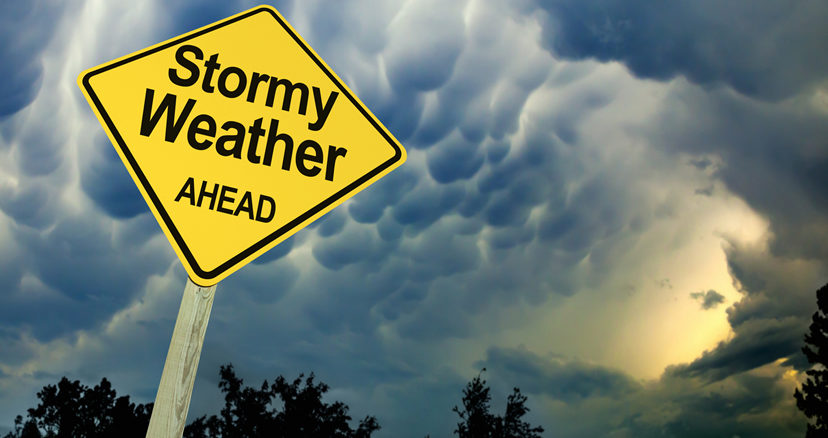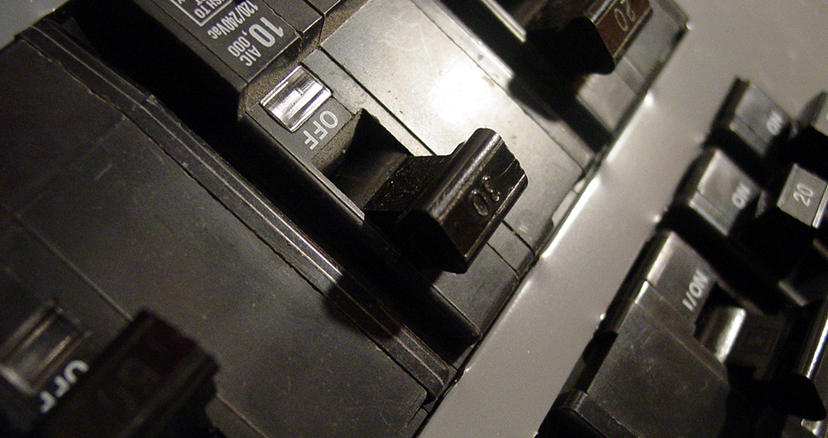
Spring is just around the corner. For Kansas, spring marks a very important date on the calendar: the start of tornado season. With unpredictable temperatures, wind-driven rain, lightning and hail on the way, it’s important to take the following electric safety precautions to keep your home and your family safe.
1. Inspect the wiring to your outdoor appliances.
Not every winter is created equal. While the Wichita area doesn’t always see much snow, cold temperatures and ice can damage wires to air conditioners and other outside appliances. While you’re doing your first yard clean up and mow of the season, make sure you inspect any accessible outdoor wiring for cold-weather damage.
2. Get your outdoor electric equipment ready for the landscaping season.
Have you opted for an electric mower or trimmer instead of gas-powered equipment? It’s a good idea to inspect and tune the equipment before your grass has grown up to your knees. Depending on how you chose to store the equipment, mice could have chewed the wiring while looking for a warm hiding spot or the cold weather may have zapped all of the energy from batteries.
3. Check outdoor outlets for cold weather damage.
Take a walk around your house and check the outside outlets, especially if you haven’t looked at them since you unplugged your holiday decorations. If you forgot to cover them properly, moisture could’ve trickled in and caused damage.
4. See if any tree limbs are hanging close to power lines.
Over the winter, ice and snow can weigh down branches, causing them to fall close to or on power lines.
You should also walk around your property and see if any trees are growing dangerously close to power lines. By preventatively trimming trees and large bushes, you can help prevent unnecessary power outages during the high-wind storm season.
5. Clean out dryer ducts and vents.
There’s no doubt that your dryer has been working overtime all winter. Large blankets, sweaters and jackets usually take longer to dry than shorts and tank tops. Longer dry times and fluffy blankets can cause extra build up in your dryer ducts and vents. Remove any lint and residue build up—lint is extremely flammable and prevents your dryer from operating efficiently.
6. Vacuum refrigerator coils.
While you’ve been preventing chilly breezes from entering your home over the winter months, your refrigerator has be trapped against the wall, sucking in all the dust that’s collected. When you’re cleaning out the leftovers that have collected in your fridge and freezer, make sure you add “vacuuming the coils” to your spring cleaning list. The coils are located on either the back or bottom of the fridge. Use a vacuum to remove the debris and help your fridge run more efficiently when the weather warms up.
7. Check light bulb wattages.
When you’re dusting your way around the house, cleaning lampshades and sucking up spiderwebs that have collected around ceiling fixtures, it’s a good idea to make sure you’re using the correct wattage light bulb. Most fixtures have a max wattage listed. If the light bulb you installed is over the threshold, you’re at risk for sparking an electrical fire.
8. Make sure you’re not overloading outlets and surge protectors.
It’s also smart to check your surge protectors while you’re spring cleaning. Warmer weather means you’ll be plugging in air conditioners, dehumidifiers and fans. Now is the time to plan for the increased electrical load and make sure you have a place to plug in these cooling devices before the mercury climbs to the top of the thermometer.
9. Get underground lines marked for warm weather renovations.
Spring is a great time to start a major outdoor renovation project, like installing an inground pool or putting up a new privacy fence. For any project that involves digging, you’ll need to call 811 have underground lines marked before you can start excavating.
10. Make sure your fire extinguisher is not expired.
In the event of a fire, you need a properly coded fire extinguisher to put out the blaze. More importantly, fire extinguishers lose their charge over time. Inspect the fire extinguisher to make sure it can put out an electrical fire and that it hasn’t lost its charge.
If you spot any electrical problems during your spring inspection, Graf Electric can help. Contact us today at 316-686-2090 to schedule an appointment.


